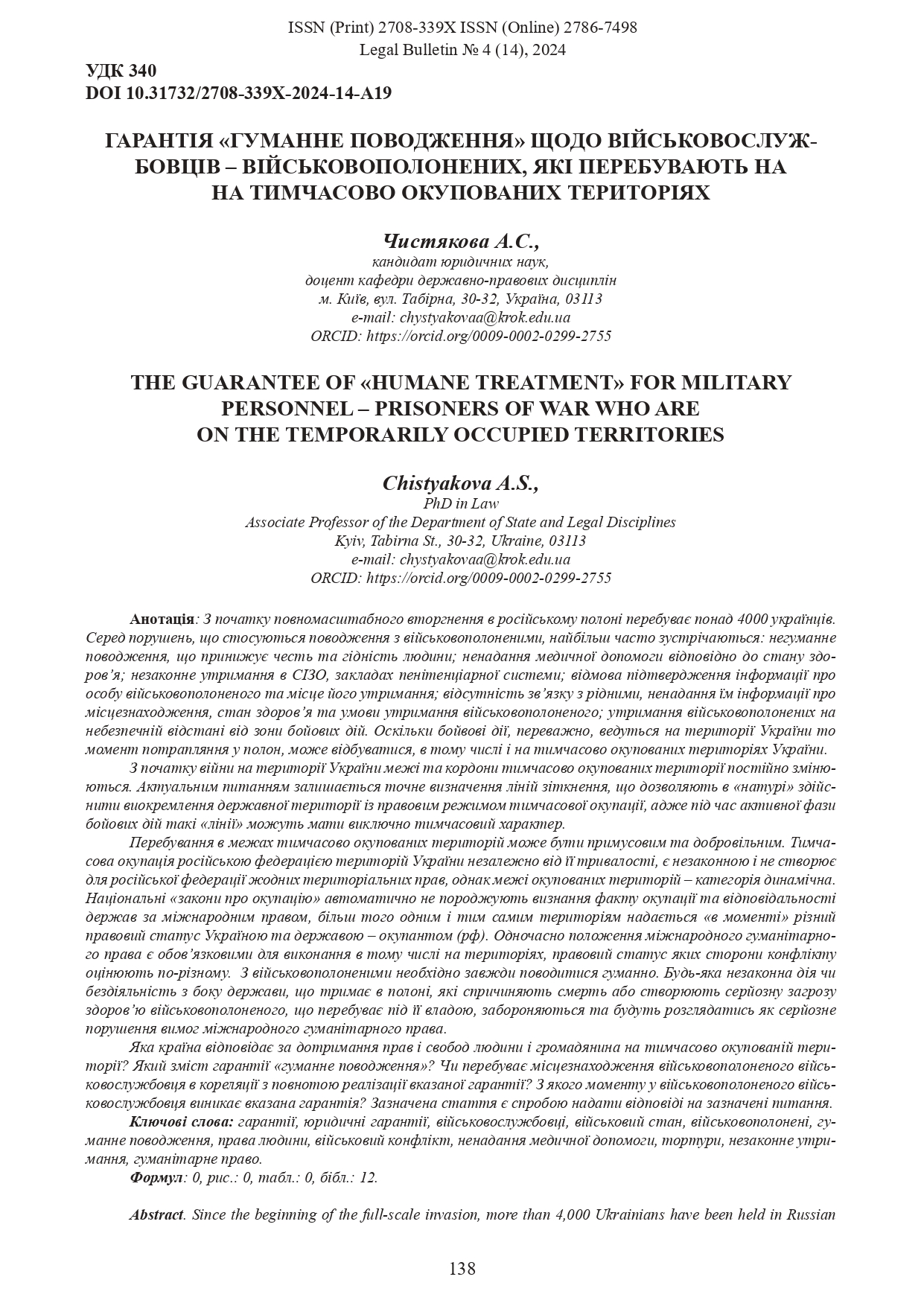THE GUARANTEE OF «HUMANE TREATMENT» FOR MILITARY PERSONNEL – PRISONERS OF WAR WHO ARE ON THE TEMPORARILY OCCUPIED TERRITORIES
DOI:
https://doi.org/10.31732/2708-339X-2024-14-A19Keywords:
guarantees, legal guarantees, military personnel, martial law, prisoners of war, humane treatment, human rights, military conflict, failure to provide medical care, torture, illegal detention, humanitarian lawAbstract
Since the beginning of the full-scale invasion, more than 4,000 Ukrainians have been held in Russian captivity. Among the violations related to the treatment of prisoners of war, the most common are: inhumane treatment that degrades the honor and dignity of a person; failure to provide medical care in accordance with the state of health; illegal detention in pre-trial detention centers and penitentiary institutions; refusal to confirm information about the identity of a prisoner of war and the place of his or her detention; lack of communication with relatives, failure to provide them with information about the whereabouts, health status and conditions of detention of a prisoner of war; detention of prisoners of war at a dangerous distance from the territory of Ukraine. Since the hostilities are mainly conducted on the territory of Ukraine, the moment of capture can occur, among other things, on the temporarily occupied territories of Ukraine.
Since the beginning of the war on the territory of Ukraine, the borders and boundaries of the temporarily occupied territories have been constantly changing. An urgent issue is the exact definition of the contact lines, which allow for the «natural» separation of the state territory with the legal regime of temporary occupation, since during the active phase of hostilities such «lines» can be of an exclusively temporary nature.
Staying within the temporarily occupied territories can be forced and voluntary. The temporary occupation of the territories of Ukraine by the Russian Federation, regardless of its duration, is illegal and does not create any territorial rights for the Russian Federation, but the boundaries of the occupied territories are a dynamic category. National «laws on occupation» do not automatically give rise to the recognition of the fact of occupation and the responsibility of states under international law, and moreover, the same territories are granted different legal status by Ukraine and the occupying state (the Russian Federation) «in the moment». At the same time, the provisions of international humanitarian law are binding, including on the territories whose legal status is assessed differently by the parties to the conflict. Prisoners of war must always be treated humanely. Any unlawful act or omission on the part of the POW-holding Power that causes death or seriously endangers the health of a POW under its authority is prohibited and will be considered a serious violation of international humanitarian law.
Which country is responsible for the observance of human and civil rights and freedoms in the temporarily occupied territory? What is the content of the «humane treatment» guarantee? Is the location of a prisoner of war correlated with the full realization of this guarantee? From what moment does the said guarantee
References
Росія порушує всі норми Женевських конвенцій у поводженні з військовополоненими: за матеріалами правозахисної групи «Січ». URL: https://sich-pravo.org/rosiia-porushuie-vsi-normy-zhenevskykh-konventsij-u-povodzhenni-z-vijskovopolonenymy/ (дата звернення: 01.11.2024)
Женевська конвенція про поводження з військовополоненими від 12 серпня 1949 року, яку ратифіковано із застереженнями Указом ПВС УРСР від 03.07.1954 // URL: https://zakon.rada.gov.ua/laws/show/995_153#Text (дата звернення: 01.11.2024)
Закон України «Про забезпечення прав і свобод громадян та правовий режим на тимчасово окупованій території України» від 15.04.2014 № 1207-VII, URL: https://zakon.rada.gov.ua/laws/show/1207-18#Text (дата звернення: 01.11.2024)
Див., наприклад, Австралія, Посібник з права збройних конфліктів, 2006 р., п. 9.58; Чад, Посібник з МГП, 1996 р., с. 28 (версія до ратифікації Чадом Додаткового протоколу II); Непал, Посібник для армії, 2011 р., с. 6; Шрі-Ланка, Військовий статут, 2003 р., п. 1222; Туреччина, Посібник з права збройних конфліктів, 2001 р., с. 158; Сполучене Королівство, Спільна доктрина щодо полонених осіб, 2015 р., с. 2-7, п. 211(i); і Сполучені Штати Америки, Військово-морський посібник, 2017 р., п. 11.2.
Див., наприклад, Чад, Посібник з МГП, 1996 р., с. 28; Данія, Військовий статут, 2016 р., с. 476; Шрі-Ланка, Військовий статут, 2003 р., п. 1221; Туреччина, Посібник з права збройних конфліктів, 2001 р., с. 158; Сполучене Королівство, Спільна доктрина щодо полонених осіб, 2015 р., с. 2-5, п. 211(b); та Сполучені Штати Америки, Військово-морський посібник, 2017 р., п. 11.2.
Див., наприклад, Сполучене Королівство, Спільна доктрина щодо полонених осіб, 2015 р., с. 2-6, п. 211(f), і Сполучені Штати Америки, Військово-морський посібник, 2017 р., п. 11.2.
Див., наприклад, Чад, Посібник з МГП, 1996 р., с. 28; Шрі-Ланка, Військовий статут, 2003 р., п. 1228; Туреччина, Посібник з права збройних конфліктів, 2001 р., с. 158; Сполучене Королівство, Спільна доктрина щодо полонених осіб, 2015 р., с. 2-6, п. 211(d).
Див., наприклад, Канада, Посібник з поводження з військовополоненими, 2004 р., с. 1B-4; Чад, Посібник з МГП, 1996 р., с. 28; Данія, Військовий статут, 2016 р., с. 475; Шрі-Ланка, Військовий статут, 2003 р., п. 1228; Туреччина, Посібник з права збройних конфліктів.
Див., наприклад, Чад, Посібник з МГП, 1996 р., с. 28; Данія, Військовий статут, 2016 р., с. 476; Шрі-Ланка, Військовий статут, 2003 р., п. 1228; і Туреччина, Посібник з права збройних конфліктів, 2001 р., с. 158.
Див., наприклад, Нова Зеландія, Військовий статут, 2019, т. 4, с. 12-14, п. 12.3.7, та Сполучені Штати Америки, Міністерство оборони, Огляд дотримання Міністерством оборони Указу Президента про умови тримання військовополонених, 2009 р., с. 29.
Посібник для армії, 2011 р., с. 3; Шрі-Ланка, Військовий статут, 2003 р., п. 1228; Туреччина, Посібник з права збройних конфліктів, 2001 р., сс. 159-160; Сполучене Королівство, Спільна доктрина щодо полонених осіб, 2015 р., с. 2-7, п. 211(l); та Сполучені Штати Америки, Міністерство оборони (МО), Програма щодо військовополонених МО, Директива № 2310.01E, 19 серпня 2014 року, розділ 3(b)(1) («Політика»). Див. також Копенгагенський процес: Принципи та керівні положення (2012), пп. 2, 9 і 10.
Стаття 13 «Гуманне поводження з військовополоненими», коментар до Женевської конвенції про військовополонених. URL: https://blogs.icrc.org/ua/2024/10/komentar-geneva-konventsiya-viyskovopolohneni/13. (дата звернення: 01.11.2024)






